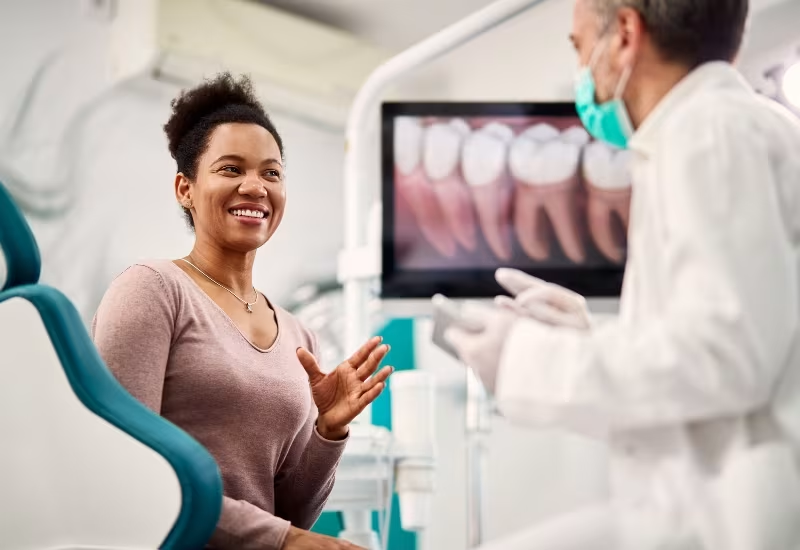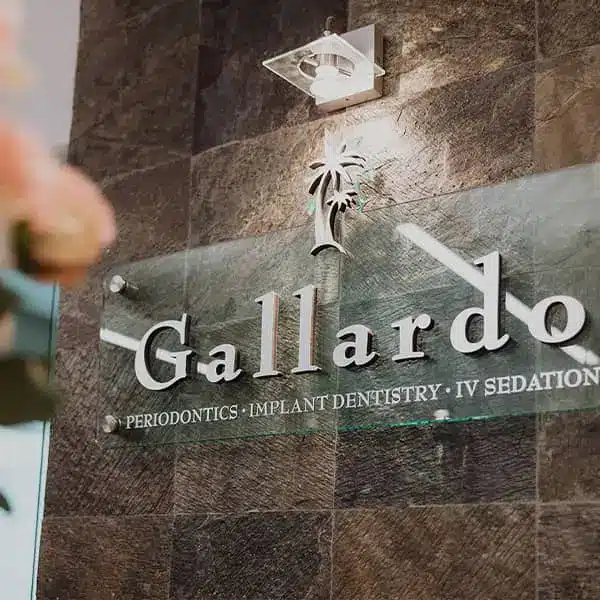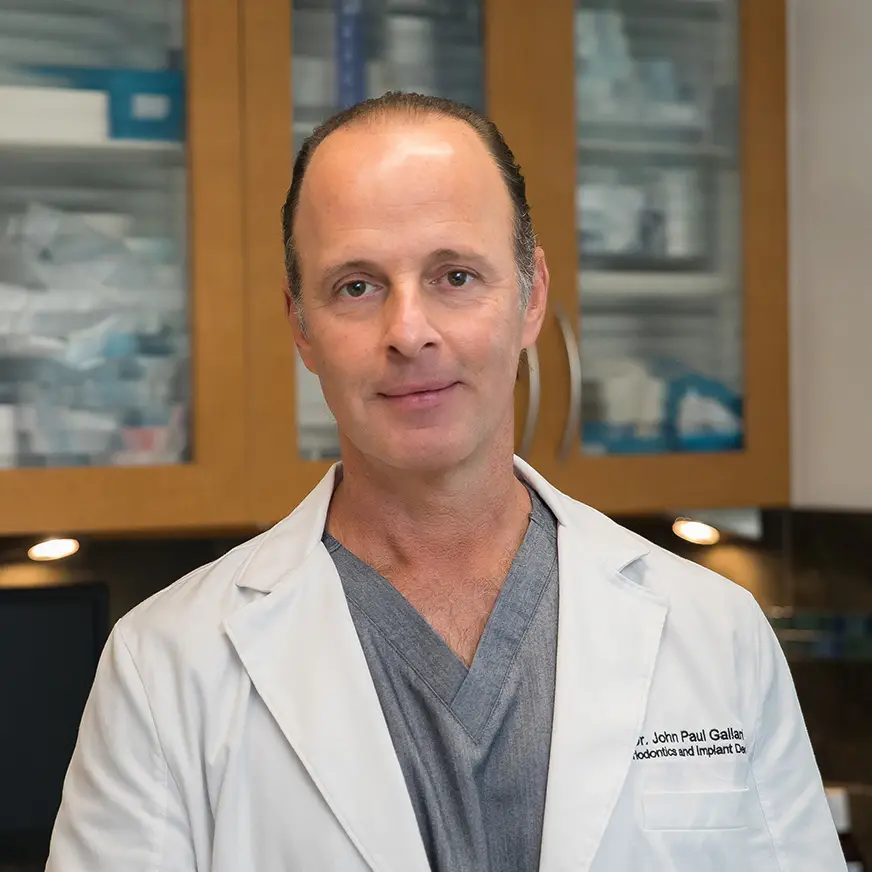Home / Dental Services / Oral Cancer Screening
Oral Cancer Screening in Miami
Oral cancer is the sixth most common type of cancer worldwide. Early detection is essential, as oral cancers are often diagnosed at an early stage, allowing patients to begin treatment before symptoms appear. Stop by our office today to schedule your screening.
Early Detection Saves Lives
- Early Cancer Detection: Catching oral cancer early means more treatment options and a better outcome.
- Advanced Screening Tech: Benefit from modern technology that spots issues earlier than visual checks alone.
- Quick, Painless Process: This screening is simple, swift, and comfortable, fitting easily into your schedule.
- Experienced Team: Dr. Gallardo's expertise ensures thorough and reliable screenings.
- Comprehensive Care and Follow-Up: If anything is found, Dr. Gallardo and his team will support and guide you throughout the process.
Who Should Be Tested for Oral Cancer?
Oral cancer screenings are crucial for everyone, but especially for those at higher risk. According to the American Cancer Society, nearly 55,000 Americans are diagnosed annually, and early detection is key. Individuals at higher risk include:
- Tobacco users (smoking or smokeless).
- Heavy alcohol drinkers.
- Those with a family history of oral cancer.
- People with HPV infections.
- Individuals previously diagnosed with head or neck cancer.
- Those who chew betel nuts and/or use drugs such as marijuana or cocaine, as these habits increase the risk of developing oral cancer.
At Gallardo Periodontics in Miami, Dr. Gallardo’s team uses advanced screening methods to detect abnormalities early. It only takes a few minutes and could save your life.

Types of Oral Cancer
Over 90% of mouth or oral tumors originate from squamous cells, also known as mucosa, which are the cells lining the interior of the oral cavity. This cancer type develops when squamous cells become abnormal due to mutations.
Other types include verrucous carcinoma, oral melanoma, lip cancer, gum and jaw cancer, tongue carcinoma, and salivary gland carcinoma.
Common Symptoms of Oral Cancer
Symptoms of oral cancer vary from person to person, but since early detection is essential for successful treatment and recovery, it’s important to know the potential signs and report them to Dr. Gallardo as soon as possible. Call our Miami dental office or click here to schedule an appointment if you notice:
- Swelling, lumps, or rough patches on any area inside your mouth.
- A loss of feeling in the mouth, face, or neck area.
- Unexplained bleeding inside the mouth.
- Sores on the mouth, face, or neck that do not heal, and chronic sore throat, hoarseness, or ear pain.
- A feeling that something is stuck in the back of your throat.
- Difficulty swallowing, chewing, speaking, moving your jaw, or moving your tongue.
- Dramatic weight loss.
- A change in the fit of your dentures.
Protect Yourself Against Oral Cancer
Oral cancer will take more than 12,000 lives in 2024.
A simple screening could prevent you from becoming a statistic.
The Oral Cancer Screening Process
ORAL CANCER CAN BE DETECTED BY A DOCTOR OR DENTIST
Step 1
Visual Examination
Step 2
Physical Examination
Step 3
Use of Advanced Technology
Risk Factors for Oral Cancer
Smoking And Tobacco Use
Smoking and using tobacco products, like chewing tobacco, are major risk factors for oral cancer. Pipe smoking increases the risk of lip cancer where the pipe touches the mouth. The smoke inhaled from any tobacco device can contribute to cancer in the throat, such as larynx cancer and esophageal cancer. Using smokeless tobacco can also increase your risk of developing oral cancer.
Age And Gender
Your age and gender can also influence your risk of developing cancer. For example, men are more than twice as likely as women to be diagnosed with oral cancer. One reason for the elevated rates of oral cancer in men might be that more men smoke and drink heavily than women. Annual screenings are especially important for older adults, as they have a higher chance of developing oral cancer. Most patients with oral cancer are over the age of 55.
Viral Infections
The human papillomavirus (HPV) is a fairly common virus. There are hundreds of strains of HPV, some of which are relatively harmless and merely lead to the development of benign warts (papillomas). However, other forms of HPV can contribute to cancer, and various types of HPV can cause cancer of the mouth or throat. Since there are so many types of HPV, it’s possible to have some form of the virus and never develop cancer or even any symptoms.
Drinking Alcohol
Drinking alcohol heavily can elevate your risk of developing oral cancer. Nearly 70% of people with oral cancer also happen to be heavy drinkers. Smoking and drinking alcohol combined seem to raise the risk of developing oral cancer dramatically.
Sun Exposure
Prolonged exposure to sunlight, without adequate protection, can increase the risk of lip cancer due to UV radiation. Using lip balm with an appropriate SPF can help mitigate this risk. It is also advisable to wear wide-brimmed hats and stay in the shade during peak sunlight hours to further reduce UV exposure to the face and lips.
Diet
Eating a nutritious diet can help to reduce your risk of developing cancer. People who eat a diet low in vegetables and fruits tend to have a higher risk of cancer than people who do eat a lot of these nutrition-packed foods.
Genetics and Family History
Individuals with a family history of oral cancer may have a higher risk, suggesting a genetic predisposition to developing the disease. Those with a family history of oral cancer need to discuss their risk factors with healthcare providers and consider genetic counseling for personalized screening and prevention strategies.
Poor Oral Hygiene
Poor oral health and periodontal disease have been associated with an increased risk of oral cancer. Regular dental check-ups with a dental professional and good oral hygiene practices can help reduce this risk.
What Our Patients Say
Committed to your results
Cost of Oral Cancer Screening in Miami, FL
The cost of oral cancer screening in Miami, FL, can vary depending on the location, insurance coverage, and any additional tests necessary.
Detailed information on the cost of the screening will be discussed during your appointment at Gallardo Periodontics and Implant Dentistry. Investing in regular oral cancer screenings is a critical step in maintaining your oral health and overall well-being.


Why Choose Dr. Gallardo for Oral Cancer Screening in Miami, FL?
Dr. John Paul Gallardo is a highly skilled periodontist and dental implant expert dedicated to providing comprehensive preventive dental care, including oral cancer screenings, to his patients in Miami, Florida. Dr. John Paul Gallardo brings:
- Dr. Gallardo has 30 years of experience offering dental implants and specialized periodontics to patients throughout South Florida.
- Utilization of advanced technology and tools in his state-of-the-art facility to ensure accurate and efficient screenings, enhancing treatment success rates.
- A strong commitment to patient care in dental health, establishing him as a leading choice for oral cancer screenings in Miami, FL.
- Dr. Gallardo remains a leader in periodontics and implant dentistry through his active and past involvement with University of Florida, Florida Association of Periodontists and North American Society of Periodontists.
Dr. Gallardo is an ideal choice for oral cancer screenings in Miami, FL, to engage in preventative measures for better oral health and well-being.
Oral Cancer Screening FAQs
What is oral cancer screening?
Oral cancer screening is a preventive procedure that involves examining the oral cavity for signs of cancerous or precancerous lesions. Detecting oral cancer early substantially boosts the likelihood of effective treatment and improved outcomes.
Are oral cancer screenings necessary?
Yes, cancer screenings are very necessary! Oral cancer is the sixth most common cancer in the US, and, sadly, only about 50 to 60% of people who get it survive for 5 years or more. This is because most oral cancers are found at later stages when the disease is harder to treat. Early detection can lead to prompt treatment that could save your life.
How is oral cancer diagnosed?
Oral cancer is diagnosed through a physical examination to look for abnormalities in the mouth, lips, and gums, such as lumps, ulcers, and sores. If your dentist finds a concerning sign, they will perform a biopsy to confirm the diagnosis.
Can oral cancer be cured?
Yes, when treated early, oral cancer can be cured. You can also reduce your risk of getting it by avoiding tobacco of any form, using lip balm with SPF 30 or higher, limiting alcohol, and seeing your dentist regularly for an oral cancer screening.
How often should I get screened for oral cancer?
Most adults should get a professional oral cancer screening at least once a year. However, people with increased risk factors, such as smokers, heavy drinkers, and those with a family history of oral cancer, may need to get screened more frequently.
Can I detect oral cancer at home?
While only a biopsy can confirm an oral cancer diagnosis, you can (and should) get into the habit of self-examining at home once a month in between dentist visits. Click here for a step-by-step guide on how to check your mouth for oral cancer at home.
What oral cancer screening office is near me?
If you live near Miami, FL, Gallardo Periodontics and Implant Dentistry offers oral cancer screening among its services, and is conveniently located at 2020 SW 27th Ave Miami, FL 33145